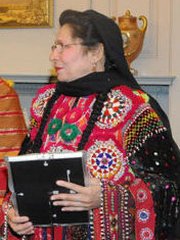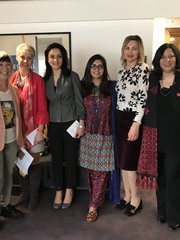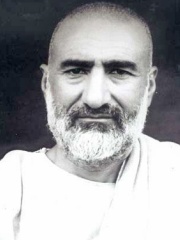
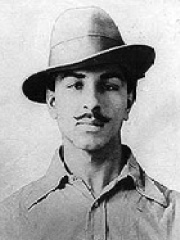
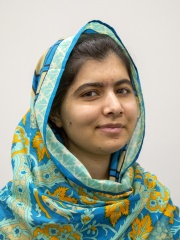
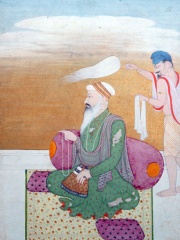
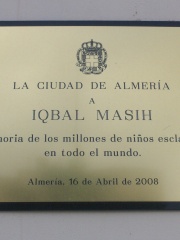
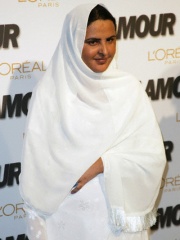
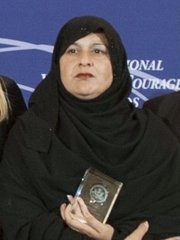
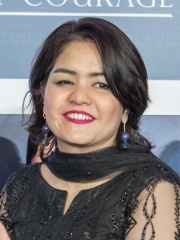
The Most Famous
SOCIAL ACTIVISTS from Pakistan
This page contains a list of the greatest Pakistani Social Activists. The pantheon dataset contains 840 Social Activists, 15 of which were born in Pakistan. This makes Pakistan the birth place of the 12th most number of Social Activists behind South Africa, and Japan.
Top 10
The following people are considered by Pantheon to be the top 10 most legendary Pakistani Social Activists of all time. This list of famous Pakistani Social Activists is sorted by HPI (Historical Popularity Index), a metric that aggregates information on a biography's online popularity. Visit the rankings page to view the entire list of Pakistani Social Activists.

1. Bacha Khan (1890 - 1988)
With an HPI of 75.37, Bacha Khan is the most famous Pakistani Social Activist. His biography has been translated into 47 different languages on wikipedia.
Abdul Ghaffar Khan (Pashto: عبدالغفار خان; 6 February 1890 – 20 January 1988), also known as Bacha Khan (Pashto: باچا خان) or Badshah Khan (بادشاه خان, 'King of Chiefs') was an Indian independence activist from the North-West Frontier Province, and founder of the Khudai Khidmatgar resistance movement against British rule in colonial India. After the partition occurred, he became a Pakistani politician and led the Azad Party. He was a political and spiritual leader known for his nonviolent opposition and lifelong pacifism; he was a devout Muslim and an advocate for Hindu–Muslim unity in the subcontinent. Because of his similar ideology and close friendship with Mahatma Gandhi, Khan was nicknamed Sarhadi Gandhi (सरहदी गांधी, 'the Frontier Gandhi'). In 1929, Khan founded the Khudai Khidmatgar, an anti-colonial nonviolent resistance movement. The Khudai Khidmatgar's success and popularity eventually prompted the colonial government to launch numerous crackdowns against Khan and his supporters; the Khudai Khidmatgar experienced some of the most severe repression of the entire Indian independence movement. Khan strongly opposed the proposal for the partition of India into the Muslim-majority Dominion of Pakistan and the Hindu-majority Dominion of India, and consequently sided with the pro-union Indian National Congress and All-India Azad Muslim Conference against the pro-partition All-India Muslim League. When the Indian National Congress reluctantly declared its acceptance of the partition plan without consulting the Khudai Khidmatgar leaders, he felt deeply betrayed, telling the Congress leaders "you have thrown us to the wolves." In June 1947, Khan and other Khudai Khidmatgar leaders formally issued the Bannu Resolution to the British authorities, demanding that the ethnic Pashtuns be given a choice to have an independent state of Pashtunistan, which was to comprise all of the Pashtun territories of British India and not be included (as almost all other Muslim-majority provinces were) within the state of Pakistan—the creation of which was still underway at the time. However, the British government refused the demands of this resolution. In response, Khan and his elder brother, Abdul Jabbar Khan, boycotted the 1947 North-West Frontier Province referendum on whether the province should be merged with India or Pakistan, objecting that it did not offer options for the Pashtun-majority province to become independent. After the partition of India by the British government, Khan pledged allegiance to the newly created nation of Pakistan, and stayed in the now-Pakistani North-West Frontier Province; he was frequently arrested by the Pakistani government between 1948 and 1954. In 1956, he was again arrested for his opposition to the One Unit program, under which the government announced its plan to merge all the provinces of West Pakistan into a single unit to match the political structure of erstwhile East Pakistan (present-day Bangladesh). Khan was jailed or in exile during some years of the 1960s and 1970s. He was awarded Bharat Ratna, India's highest civilian award, by the Indian government in 1987. Following his will upon his death in Peshawar in 1988, he was buried at his house in Jalalabad, Afghanistan. Tens of thousands of mourners attended his funeral including Afghan President Mohammad Najibullah, marching through the Khyber Pass from Peshawar towards Jalalabad. It was marred by two bomb explosions that killed 15 people; despite the heavy fighting at the time due to the Soviet–Afghan War, both sides, namely the Soviet–Afghan government coalition and the Afghan mujahideen, declared an immediate ceasefire to allow Khan's burial. He was given military honours by the Afghan government.

2. Bhagat Singh (1907 - 1931)
With an HPI of 74.23, Bhagat Singh is the 2nd most famous Pakistani Social Activist. His biography has been translated into 43 different languages.
Bhagat Singh (27 September 1907 – 23 March 1931) was an Indian anti-colonial revolutionary who participated in the mistaken murder of a junior British police officer in December 1928 in what was intended to be retaliation for the death of an Indian nationalist. He later took part in a largely symbolic bombing of the Central Legislative Assembly in Delhi and a hunger strike in jail, which—on the back of sympathetic coverage in Indian-owned newspapers—turned him into a household name in the Punjab region, and, after his execution at age 23, a martyr and folk hero in Northern India. Borrowing ideas from Bolshevism and anarchism, the charismatic Bhagat Singh electrified a growing militancy in India in the 1930s and prompted urgent introspection within the Indian National Congress's nonviolent, and eventually successful, campaign for India's independence. In December 1928, Bhagat Singh and an associate, Shivaram Rajguru, both members of a small revolutionary group, the Hindustan Socialist Republican Association (also Army, or HSRA), shot dead a 21-year-old British police officer, John P. Saunders, in Lahore, Punjab, in what is today Pakistan, mistaking Saunders, who was still on probation, for the British senior police superintendent, James Scott, whom they had intended to assassinate. They held Scott responsible for the death of a popular Indian nationalist leader Lala Lajpat Rai for having ordered a lathi (baton) charge in which Rai was injured and two weeks thereafter died of a heart attack. As Saunders exited a police station on a motorcycle, he was felled by a single bullet fired from across the street by Rajguru, a marksman. As he lay injured, he was shot at close range several times by Singh, the postmortem report showing eight bullet wounds. Another associate of Singh, Chandra Shekhar Azad, shot dead an Indian police head constable, Channan Singh, who attempted to give chase as Singh and Rajguru fled. After having escaped, Bhagat Singh and his associates used pseudonyms to publicly announce avenging Lajpat Rai's death, putting up prepared posters that they had altered to show John Saunders as their intended target instead of James Scott. Singh was thereafter on the run for many months, and no convictions resulted at the time. Surfacing again in April 1929, he and another associate, Batukeshwar Dutt, set off two low-intensity homemade bombs among some unoccupied benches of the Central Legislative Assembly in Delhi. They showered leaflets from the gallery on the legislators below, shouted slogans, and allowed the authorities to arrest them. The arrest, and the resulting publicity, brought to light Singh's complicity in the John Saunders case. Awaiting trial, Singh gained public sympathy after he joined fellow defendant Jatin Das in a hunger strike, demanding better prison conditions for Indian prisoners, the strike ending in Das's death from starvation in September 1929. Bhagat Singh was convicted of the murder of John Saunders and Channan Singh, and hanged in March 1931, aged 23. He became a popular folk hero after his death. Jawaharlal Nehru wrote about him: "Bhagat Singh did not become popular because of his act of terrorism but because he seemed to vindicate, for the moment, the honour of Lala Lajpat Rai, and through him of the nation. He became a symbol; the act was forgotten, the symbol remained, and within a few months each town and village of the Punjab, and to a lesser extent in the rest of northern India, resounded with his name." In still later years, Singh, an atheist and socialist in adulthood, won admirers in India from among a political spectrum that included both communists and right-wing Hindu nationalists. Although many of Singh's associates, as well as many Indian anti-colonial revolutionaries, were also involved in daring acts and were either executed or died violent deaths, few came to be lionised in popular art and literature as did Singh, who is sometimes referred to as the Shaheed-e-Azam ("Great martyr" in Urdu and Punjabi).

3. Malala Yousafzai (b. 1997)
With an HPI of 66.51, Malala Yousafzai is the 3rd most famous Pakistani Social Activist. Her biography has been translated into 126 different languages.
Malala Yousafzai (born 12 July 1997) is a Pakistani female education activist, and producer of film and television. She is the youngest Nobel Prize laureate in history, receiving the Peace Prize in 2014 at age 17, and is the second Pakistani and the only Pashtun to receive a Nobel Prize. Yousafzai is a human rights advocate for the education of women and children in her native district, Swat, where the Pakistani Taliban had at times banned girls from attending school. Her advocacy has grown into an international movement, and according to former prime minister Shahid Khaqan Abbasi, she has become Pakistan's "most prominent citizen". The daughter of education activist Ziauddin Yousafzai, she was born to a Yousafzai Pashtun family in Swat and was named after the Afghan folk heroine Malalai of Maiwand. Considering Bacha Khan, Barack Obama, and Benazir Bhutto as her role models, she was also inspired by her father's thoughts and humanitarian work. In early 2009, when she was 11, she wrote a blog under her pseudonym Gul Makai for the BBC Urdu to detail her life during the Taliban's occupation of Swat. The following summer, journalist Adam B. Ellick made a New York Times documentary about her life as the Pakistan Armed Forces launched Operation Rah-e-Rast against the militants in Swat. In 2011, she received Pakistan's first National Youth Peace Prize. She interned for the Swat Relief Initiative, a foundation founded by Zebunisa Jilani, a princess of the Royal House of Swat which supports schools and clinics. She rose in prominence, giving interviews in print and on television, and was nominated for the International Children's Peace Prize by activist Desmond Tutu. On 9 October 2012, while on a bus in Swat District after taking an exam, Yousafzai and two other girls were shot by a Taliban gunman in an assassination attempt targeting her for her activism; the gunman fled the scene. She was struck in the head by a bullet and remained unconscious and in critical condition at the Rawalpindi Institute of Cardiology, but her condition later improved enough for her to be transferred to the Queen Elizabeth Hospital in Birmingham, UK. The attempt on her life sparked an international outpouring of support. Deutsche Welle reported in January 2013 that she may have become "the most famous teenager in the world". Weeks after the attempted murder, a group of 50 leading Muslim clerics in Pakistan issued a fatwā against those who tried to kill her. Governments, human rights organizations and feminist groups subsequently condemned the Tehrik-i-Taliban Pakistan. In response, the Taliban further denounced Yousafzai, indicating plans for a possible second assassination attempt which the Taliban felt was justified as a religious obligation. This sparked another international outcry. After her recovery, Yousafzai became a more prominent activist for the right to education. Based in Birmingham, she co-founded the Malala Fund, a non-profit organisation, with Shiza Shahid. In 2013, she co-authored I Am Malala, an international best seller. In 2013, she received the Sakharov Prize, and in 2014, she was the co-recipient of the 2014 Nobel Peace Prize with Kailash Satyarthi of India. Aged 17 at the time, she was the youngest-ever Nobel Prize laureate. In 2015, she was the subject of the Oscar-shortlisted documentary He Named Me Malala. The 2013, 2014 and 2015 issues of Time magazine featured her as one of the most influential people globally. In 2017 she was awarded honorary Canadian citizenship and became the youngest person to address the House of Commons of Canada. Yousafzai completed her secondary school education at Edgbaston High School, Birmingham in England from 2013 to 2017. From there she won a place at Lady Margaret Hall, Oxford, and undertook three years of study for a Bachelor of Arts degree in Philosophy, Politics and Economics (PPE), graduating in 2020. She returned in 2023 to become the youngest ever Honorary Fellow at Linacre College, Oxford.

4. Guru Ram Das (1534 - 1581)
With an HPI of 64.49, Guru Ram Das is the 4th most famous Pakistani Social Activist. His biography has been translated into 34 different languages.
Guru Ram Das (Gurmukhi: ਗੁਰੂ ਰਾਮ ਦਾਸ, pronunciation: [gʊɾuː ɾaːmᵊ d̯aːsᵊ]; 24 September 1534 – 1 September 1581), sometimes spelled as Guru Ramdas, was the fourth of the ten Sikh gurus. He was born to a family based in Lahore, who named him Bhai Jetha. He was orphaned at age seven; and thereafter grew up with his maternal grandmother in a village. At age 12, Bhai Jetha and his grandmother moved to Goindval, where they met Guru Amar Das, the third leader of Sikhism. The boy accepted the guru as his mentor, served him, and eventually joined his family by marrying his daughter. When it came time for Guru Amar Das to name his successor, he passed over his own sons and chose Bhai Jetha, citing his exemplary service, selfless devotion, and unquestioning obedience. Renamed Ram Das ("servant of God"), Bhai Jetha became the fourth Guru of Sikhism in 1574. He faced hostility from the sons of Guru Amar Das, and shifted his official base to lands identified by Guru Amar Das as Guru-ka-Chak. He founded the town of Ramdaspur, later renamed Amritsar and known as the holiest city of Sikhism. Unlike the first three Gurus, he appointed his own son as his successor, as would the fifth through tenth Sikh Gurus. He served until his death in 1581. He is remembered in the Sikh tradition for expanding the manji organization for clerical appointments and donation collections to theologically and economically support the Sikh movement. In a similar light to his predecessor, Guru Ram Das also encouraged widow remarriage.
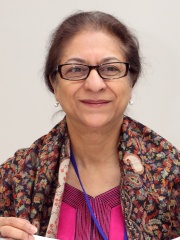
5. Asma Jahangir (1952 - 2018)
With an HPI of 53.05, Asma Jahangir is the 5th most famous Pakistani Social Activist. Her biography has been translated into 42 different languages.
Asma Jilani Jahangir (Urdu: عاصمہ جہانگیر, romanized: ʿĀṣimah Jahāṉgīr; 27 January 1952 – 11 February 2018) was a Pakistani human rights lawyer and social activist who co-founded and chaired the Human Rights Commission of Pakistan and AGHS Legal Aid Cell. Jahangir was known for playing a prominent role in the Lawyers' Movement and served as the United Nations Special Rapporteur on Freedom of Religion or Belief and as a trustee at the International Crisis Group. Born and raised in Lahore, Jahangir studied at the Convent of Jesus and Mary before receiving her B.A. from Kinnaird and LLB from the Punjab University Law College in 1978 and joined the chamber of Barrister Ijaz Hussain Batalvi. In 1980, she was called to the Lahore High Court, and to the Supreme Court in 1982. In the 1980s, Jahangir became a democracy activist and was imprisoned in 1983 for participating in the Movement for the Restoration of Democracy against the military regime of Zia-ul-Haq. In 1986, she moved to Geneva, and became the vice-chair of the Defence for Children International and remained until 1988 when she returned to Pakistan. In 1987, Jahangir co-founded the Human Rights Commission of Pakistan and became its Secretary-General. In 1993, she was elevated as the commission's chairperson. She was again put under house arrest in November 2007 after the imposition of emergency. After serving as one of the leaders of the Lawyers' Movement, she became Pakistan's first woman to serve as the President of Supreme Court Bar Association, she presided over a Seminar to pay homage to Barrister Ijaz Hussain Batalvi organised by Akhtar Aly Kureshy Convenier Ijaz Hussain Batalvi Foundation. She co-chaired South Asia Forum for Human Rights and was the vice president of International Federation for Human Rights. Jahangir served as the United Nations Special Rapporteur on Freedom of Religion from August 2004 to July 2010, including serving on the U.N. panel for inquiry into Sri Lankan human rights violations and on a United Nations fact-finding mission on Israeli settlements. In 2016, she was named as the United Nations Special Rapporteur on the Situation of Human Rights in Iran, remaining until her death in February 2018. Jahangir is the recipient of several awards including the 2014 Right Livelihood Award (along with Edward Snowden) for "defending, protecting and promoting human rights in Pakistan and more widely, often in very difficult and complex situations and at great personal risk", 2010 Freedom Award, Hilal-i-Imtiaz in 2010, Sitara-i-Imtiaz, Ramon Magsaysay Award in 2005, 1995 Martin Ennals Award for Human Rights Defenders, and the UNESCO/Bilbao Prize for the Promotion of a Culture of Human Rights. She was awarded a Legion of Honour by France, and in 2016 the University of Pennsylvania Law School awarded her an honorary degree. Her writings include The Hudood Ordinance: A Divine Sanction? and Children of a Lesser God. Jahangir was posthumously awarded the Nishan-e-Imtiaz on 23 March 2018, the highest degree of service to the state, and for services to international diplomacy by Mamnoon Hussain.

6. Iqbal Masih (1983 - 1995)
With an HPI of 52.48, Iqbal Masih is the 6th most famous Pakistani Social Activist. His biography has been translated into 27 different languages.
Iqbal Masih (1 January 1983 – 16 April 1995) was a Pakistani child labourer and activist who was a member of the Bonded Labour Liberation Front (BLLF) in Pakistan, campaigning against abusive child labour in the country. He was assassinated on 16 April 1995, at the age of 12, and was posthumously awarded the Tamgha-e-Shujaat by the government of Pakistan.

7. Mukhtar Mai (b. 1972)
With an HPI of 50.47, Mukhtar Mai is the 7th most famous Pakistani Social Activist. Her biography has been translated into 25 different languages.
Mukhtaran Bibi (Urdu: مختاراں بی بی; born c. 1972), now known as Mukhtār Mā'ī, is a Pakistani human rights activist from the village of Meerwala, located in the rural tehsil of Jatoi in the Muzaffargarh District of Punjab, Pakistan. In June 2002, Mā'ī was the victim of a gang-rape sanctioned by a tribal council of the local Mastoi clan, as a form of 'honour revenge'; the council ruling was a result of a dispute between the wealthier Mastoi Baloch clan and Mā'ī's Tatla caste. Although local custom would expect her to commit suicide after being raped, Mā'ī spoke up and pursued a case against her rapists, which was picked up by both domestic and international media. On 1 September 2002, an anti-terrorism court sentenced six men, including the four rapists, to death for rape. However, in 2005, the Lahore High Court cited "insufficient evidence" and subsequently acquitted five of the six convicted rapists, while commuting the punishment of the sixth man to a life sentence. Mā'ī and the government appealed this decision, leading the Supreme Court of Pakistan to suspend the acquittal and hold hearings for an appeal; In April 2011, the Supreme Court set aside the acquittals of four of the men, but confirmed the acquittal of the other five. Mukhataran Bibi's attorney and supporters planned an appeal of the verdict. Though the safety of Mā'ī and her family and friends has been in jeopardy since the incident, she remains an outspoken advocate for women's rights in Pakistan and elsewhere. She started the Mukhtar Mai Women's Welfare Organization to help support and educate women in rural areas throughout Pakistan. In April 2007, Mā'ī won the North–South Prize from the Council of Europe. In 2005, Glamour magazine named her 'Woman of the Year'. According to a 2006 The New York Times report, "Her autobiography is the No. 3 best seller in France, and movies are being made about her. She has been praised by dignitaries like Laura Bush and the French foreign minister". However, on 8 April 2007, The New York Times reported that Mā'ī lives in fear for her life due to threats from the Pakistani government and local feudal lords. Former President of Pakistan, Pervez Musharraf has admitted on his personal blog that he placed restrictions on her movement in 2005, as he was fearful that her work and the publicity it received would hurt the international image of Pakistan.

8. Tabassum Adnan (b. 0)
With an HPI of 41.11, Tabassum Adnan is the 8th most famous Pakistani Social Activist. Her biography has been translated into 20 different languages.
Tabassum Adnan (Urdu: تبسم عدنان; born 1977) is a Pakistani women's rights activist from the Swat Valley. She won the U.S. State Department's 2015 International Women of Courage Award for her efforts in seeking justice for Pakistani women.

9. Jalila Haider (b. 1988)
With an HPI of 38.74, Jalila Haider is the 9th most famous Pakistani Social Activist. Her biography has been translated into 18 different languages.
Jalila Haider (Urdu/Hazaragi: جلیله حیدر; born 10 December 1988) is a Pakistani human rights attorney and political activist from Quetta in Balochistan, Pakistan. She is known to be the first woman lawyer from Quetta's Hazara minority, and an advocate for the rights of her persecuted community. She is a member of the Awami Workers Party (AWP), leader of the Balochistan chapter of Women Democratic Front (WDF), and also an activist in the Pashtun Tahafuz Movement (PTM). She founded a non-profit organisation, "We the Humans – Pakistan," which aims to empower local communities in Balochistan by strengthening opportunities for vulnerable women and children. She was named in BBC's 100 Women of 2019, and was chosen as an International Woman of Courage by the United States Department of State in March 2020. In 2022, she won the first-ever ‘Pakistan Peace Award’ for her work and contribution to bring tolerance and sustainable peace in the country.
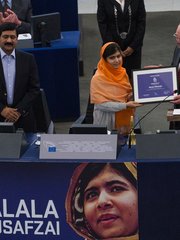
10. Ziauddin Yousafzai (b. 1969)
With an HPI of 37.66, Ziauddin Yousafzai is the 10th most famous Pakistani Social Activist. His biography has been translated into 15 different languages.
Ziauddin Yousafzai (Urdu: ضیاء الدین یوسفزئی; Pashto: ضیاالدین یوسفزی; born 20 April 1969) is a Pakistani educational entrepreneur and activist best known as the father of Nobel laureate Malala Yousafzai, who protested against the Tehrik-i-Taliban Pakistan's opposition to the education rights of girls, especially for Pakistani girls. He is currently co-founder and board member of Malala Fund and the author of Let Her Fly (2018).
People
Pantheon has 15 people classified as Pakistani social activists born between 1534 and 2000. Of these 15, 10 (66.67%) of them are still alive today. The most famous living Pakistani social activists include Malala Yousafzai, Mukhtar Mai, and Tabassum Adnan. The most famous deceased Pakistani social activists include Bacha Khan, Bhagat Singh, and Guru Ram Das. As of April 2024, 7 new Pakistani social activists have been added to Pantheon including Tabassum Adnan, Ziauddin Yousafzai, and Abia Akram.
Living Pakistani Social Activists
Go to all RankingsMalala Yousafzai
1997 - Present
HPI: 66.51
Mukhtar Mai
1972 - Present
HPI: 50.47
Tabassum Adnan
HPI: 41.11
Jalila Haider
1988 - Present
HPI: 38.74
Ziauddin Yousafzai
1969 - Present
HPI: 37.66
Abia Akram
1985 - Present
HPI: 37.28
Laila Haidari
HPI: 33.97
Begum Jan
2000 - Present
HPI: 32.70
Mahrang Baloch
1993 - Present
HPI: 30.42
Gulalai Ismail
1986 - Present
HPI: 27.11
Deceased Pakistani Social Activists
Go to all RankingsBacha Khan
1890 - 1988
HPI: 75.37
Bhagat Singh
1907 - 1931
HPI: 74.23
Guru Ram Das
1534 - 1581
HPI: 64.49
Asma Jahangir
1952 - 2018
HPI: 53.05
Iqbal Masih
1983 - 1995
HPI: 52.48
Newly Added Pakistani Social Activists (2025)
Go to all RankingsTabassum Adnan
HPI: 41.11
Ziauddin Yousafzai
1969 - Present
HPI: 37.66
Abia Akram
1985 - Present
HPI: 37.28
Laila Haidari
HPI: 33.97
Begum Jan
2000 - Present
HPI: 32.70
Mahrang Baloch
1993 - Present
HPI: 30.42
Gulalai Ismail
1986 - Present
HPI: 27.11
Overlapping Lives
Which Social Activists were alive at the same time? This visualization shows the lifespans of the 4 most globally memorable Social Activists since 1700.



